It’s December 18th, 9:02am, and I’ve just woken up after 15 hours of sleep.
I currently sit on the roof of a shoreline home, and I do have strong reason to believe I’m trespassing. I didn’t hop any fences, nor smash any windows, but I’m pretty sure there is a family sleeping below. I like my spot though, and I don’t plan to move until provoked. It’s exactly what I was looking for, in fact: outside, and within ear’s reach of the crashing waves, yet away from the sun, and only partially tormented by the wind. I’m in the desert, and man, desert mornings can be very cold.
On December 9th, I waved goodbye to Brisa and her family, mainland Europe and daily lunches of meats, cheeses, wines, family and linen table cloth, and boarded the ferry for Tangier, Morocco. The trip is about 90 minutes long, and was the official beginning of a 4-6 month sojourn in and through North and West (90% West) Africa. I was nervous, actually, sitting in that ferry terminal, having arrived far too early and with far too much time to think. This West Africa idea has been in my head for months now, and aside from my own thoughts, it’s been met with more than plenty of “that seems like a bad idea,” “I strongly urge you not to do that,” and “Sorry, but I simply can’t sign off on this” from the outside. So, as the wait at the terminal secretarially marked the official start of the journey, my nerves began to dance. Still, with a freshly-stocked iPod, a newly-purchased water resistant sun hat, a backpack full of medicine and over X,XXX€ strapped to my waist and chest, I was as ready as I’d ever be.
I arrived at the port around 3:30, chuckled at the taxi driver offering a 200 dirham fare into town, waltzed around the corner and boarded the identically-bound bus for 25 dirhams, and was eventually in Tangier. No more than 3 footsteps from the bus, and the Africa that I personally remember got started.
“Hi my friend, where are you going? I work for tourism board–I give you special price!”
“Thanks, but I have a ride.”
“Where is he? Where do you go? I give you better price!”
“No thanks. Please leave me alone.”
I crossed the street, asked some girls at a bus stop for directions–“Comment va-t-on à la gare du train?”–and got on my way.
I was immediately struck by how not-Europe Tangier looked. I figured it would be similar enough to Spain, given it’s canoe-able proximity and popularity among Spanish tourists. However, Morocco’s most northern city (Ceuta possibly excluded, although that’s a Spanish territory anyway) brought a whole different level of pollution, dynamism, and general motley than the palatial shores of Algeciras and my most recent accommodation; my trip to Africa had begun.
I walked my way to the train, and roughly 4 hours later, was greeted by Elmar in Rabat–an Italian NGO worker, and my first CouchSurfing host in Morocco. I went back to his apartment, charismatic in its own simplicity, met the 4 Czechs also surfing with Elmar–
and settled in for a sleep.
The next day, and it was off to do visa research. This is the real reason I went to Rabat anyway, to secure visas for Guinea and Mauritania. After waving goodbye to the Czechs, some Kiri’d bread (Kiri is short for La Vache Qui Rit, or The Cow That Laughs in English–a standard brand of cheese you’ve probably seen before) and the staple mint tea, I headed to the Mauritanian embassy in search of some answers.
I arrived at 10:30, and was quickly denied; the visa office had already finished its daily dole of visas, and I’d need to come back tomorrow. Not to worry–time is on my side.
Still hungry, or perhaps newly hungry, I found my way to the Medina, wandered into a fish sandwich and glass of fresh-squeezed orange, and began to look around. Rugs, smells, fish sandwiches, silver and hookahs, and many stolid, pensive, yet friendly faces. A lot of the Medina had that Santorini feel to it, with the bottom 3 feet of white cement alleyways painted blue. The place was incredibly photogenic.
With a stomach content, I set off for the Guinean embassy. “Bring your passport, a letter of invitation, two passport photos, a photocopy of your passport, and the money tomorrow between 2 and 3, and you can pick up your visa at the same time the following day,” she said with a smile.
Good things. I promptly left, in search of an Internet cafe (called a cyber here) in which to print a few of the visa documents. Once in the cafe, I met a Japanese girl named Miyu and a German guy named Daniel, both also heading south, who quickly informed me that the fight for the Mauritanian visa each day is a bit fiercer than I’d heard, and in order to assure that you’ll really get one, you have to sleep there the night before. So, that’s what we did: sleeping bag, blankets, paninis–the whole thing.
We arrived around 10:45, just Miyu and I, and with the exception of two Moroccan guys and the embassy’s night guard, there was no one else there. Come 5:30am, this changed. People started piling in, slowly at first, chatting loudly in French and apparent friendship. Miyu and I had put our names on some crumply list a few hours prior, numbers 4 and 5, and therefore didn’t feel the need to physically assert ourselves at the front of the line. The embassy was meant to open at 7, and we continued to sleep.
Around 6:15, people started getting pushy. Older French tourists claiming they’d been there since the morning before, an Italian guy out of nowhere, and one Senegalese guy who futilely appointed himself as the grand peacekeeper–a conductor among a brazen orchestra of the angry and determined. Miyu and I quickly packed our stuff, and pushed to the front.
The following hour was eventful. A small fistfight, everyone yelling. “Il faut respecter la liste!” “La liste n’importe pas, il faut se reveiller!” Police showed up, and silence fell for a short minute. Back to yelling just after. The embassy only gives out 100 visas per day, and we all wanted to head south.
In the end, the list was respected, with myself and Miyu dropping off our passports fourth and fifth. We hitched a ride halfway back to town, and then took a cab the rest of the way to Elmar’s. There, we crashed for two hours, and headed right back to the embassy.
The office re-opened around 2:30pm, half-hour earlier than promised, and Miyu and I successfully get our visas. Hers for 30 days, mine for 15. Not sure why, but essentially irrelevant; I don’t think I’ll be in Mauritania for all that long.
The next day, I set off early for the Medina, and wanted to take some pictures; some vendors, and some of their things, mostly. Most were reluctant, dismissing me in that scornful, miserable, head-shaking tone, while a few were very inviting. I got to speak more French in both cases, so that’s definitely a plus.
After the market, I took a tea near the central station, and did some reading. Paul Theroux’s “Dark Star Safari” is currently batting first on the NOOK. It’s about Paul’s travels from Cairo to Cape Town, and it has started off pretty strongly. He’s still in Egypt, but his Sudan visa was just approved. I’d love to go to Sudan. I thought I couldn’t on my current passport, since I have that ever-irritating Israel stamp, but Paul actually had the same, and was still given a visa. So maybe.
After tea, I headed to the Guinean embassy and picked up my visa. No hassle, all smiles–1,000 MAD (roughly $130) for a 6 month, multiple entry visa. Not so bad, really. If the embassy and its staff are any indication of what the country will be like–a large garden, orange trees and friendly smiles–I’m in for a real treat.
Outside of embassy, I began talking with Monsieur Bah, who I had met the day before. Very nice guy, Guinean, and seemed genuinely interested in giving me his time. He asked where I was going, I replied “food,” and he offered to walk me down the street. We already had a nice conversation going, him talking to me about Kankan (where Ill be staying for ~10 weeks) and helping me with my French, and I was more than happy to prolong it further.
We walked down the street for about 10 minutes, and reached a Japanese restaurant. He asked me if
I liked basic stir-fry, I said yes, and he ordered me a plate. He said he couldn’t stay to eat, but would see me when I passed the embassy on my way back home. He then found out the price, asked me if I knew how Moroccan Dirhams work, and instructed me to pay upon leaving.
Really nice guy, but a suspect move nonetheless. The plate was about $7.50–not very much–but still, roughly 6 times what I would have spent on dinner myself. Whatever. Still a nice guy.
From the embassy, I did some reading in the National Library, picked up some clementines and cookies, and waited for Elmar back at home. We shared some stories, some food, and talked about his recent trip from Dar Es Salaam to Rabat, by way of Zambia/Brazzaville/Angola/Côte D’Ivoire/Guinea/Mali, kind of thing. Drinking in Brazzaville with Congolese mercenaries was the highlight.
Overall, I liked Rabat. It was calm, artistic, and just hectic enough to remind me that I’m back in Africa, with so much adventure in the road ahead.
The following day, it was off to Casablanca. I woke up around 8:00am, said goodbye to Elmar, grabbed a quick breakfast (probably a fish sandwich from the Medina), some clementines and an avocado, and headed out to the road. Casablanca is only about 100km away, and the plan was to hitchhike.
About 4km of walking later, and I found a good spot. Plenty of cars, far enough from the city such that all passing are very likely to be leaving the city, and with plenty of space to see me, study me, and stop.
I waited for an hour, and that was that. In Argentina, almost all would look at me, wave about and scrunch their facial, and continue forward. Here, nobody really looked. They didn’t seem offended, didn’t seem apprehensive, didn’t seem confused; they just seemed like they didn’t care much at all. I wandered down the road to the bus terminal, got on a bus within 90 seconds, paid my fare of ~2€, and arrived in Casablanca about an hour later. I have the balls to be a long term hitch-hiker, I think, but maybe not the patience. I should really dedicate more time to it, actually, and give it a real shot. Oh well.
Once in Casa, I met up with my CouchSurfing host, Ayoub. He’s originally from Tangier, and now lives down here. He speaks English, Spanish, French and Arabic; all fluently. Not so bad. Most of our conversations ended up being in 3 different languages, for which I mostly fault him.
The day concluded with Kebabs (his with cheese and mine without), the movie Shooter (English with Arabic subtitles), and an early sleep.
I wandered the city the following day, and hit the town the following night. Ayoub called one of his friends, and we first went to a traditional bar (as they called it) with local beer, and never-ending tapas plates (they kept refilling us when we finished) of cucumber salad, lentils, popcorn and olives. Beers later, we switched our locale to a Spanish-themed nightclub called Bodega: cute girls, drinking, and house/hip-pop. I have this theory that people everywhere are largely the same–want the same things and do the same things–and it continues to cement. We’ve all seen that scene before.
The following night, I was set to leave Casablanca for Tan Tan, the last city before entering Western Sahara. First, however, Ayoub made us dinner: a traditional Moroccan tagine–a meatball/egg/tomato/garlic/cilantro-type dish, prepared under a small clay cone–that you scoop out with large, circular bread.
I arrived in Tan Tan around 1:30 the following afternoon, and went looking for, well, a toilet. I found a cafe, which turned out to no longer exist, but rather served as someone’s home, and I was ushered in by 7 or 8 small children playing soccer outside. They were utterly beaming at my presence, running around fetching me the bucket, showing me how the door worked, etc. Yes, I’m a white guy–and I’m back to being a fascinating specimen.
Next, I wandered into town, got a great steak-mixte sandwich plus fries for 20 dirhams, and began the search for a ride south. I had heard of a few campgrounds near the beach, which I assumed to be packed with tech-y Germans in cars far more capable than necessary. I walked to la gare, paid my 11 dirham fare for the 25km trip to the coast, and squashed my way into the backseat.
I found the campgrounds, and I was right about the Germans. Well, mostly just the fact that there were Germans; the part about the cars and the southbound disposition was in unfortunate absence. No luck with a ride.
Next, I went into the small town-area by the beach, and began to ask further. One man with really strong French (far fewer people speak French here than in Casa and Rabat, it seems) directed me to this big intersection, where all of the sardine haulers pass on their way to Laayoune, and apparently pick up hitchhikers with relatively high frequency. “Le rond point que vous voulez se trouve seulement 200m par là,” he said.
1.5km of walking later, and I arrived at the intersection. There were a bunch of Moroccans out there trying to hitch south as well which, I was told, is rather easy to do. However, most drivers ask for money, which kind of defeats the purpose of hitchhiking, to one extent. The drivers don’t charge very much, but the combined fare to Dakhla works out to be almost identical to that charged by some of the cheaper bus companies. I quickly resolved to take a bus that night.
Walking back to the beach in search of a grand taxi (back to the center of Tan Tan), I was stopped by a motorcyclist who, with a massive, grainy smile and perfect French, ran down the hitchhiking situation for me, the transport back to Tan Tan, and even invited me to stay in his home if everything fell through. Terribly nice guy.
I arrived back in town around 6:30PM, and bought a bus ticket for 1am. With time to kill, I called my loosely-arranged CS host, Youness, who picked me up at a bakery down the street.
“I’m leaving town tonight as well, so I’m going to get a haircut and a shave, and then go to a hammam (traditional Moroccan bath), and you’re coming with,” he greeted.
An hour later, I’m sitting in this barber shop, a single-blade razor to my much overgrown beard, and some cucumber soufflé of pour cleansing and feminism on my face:
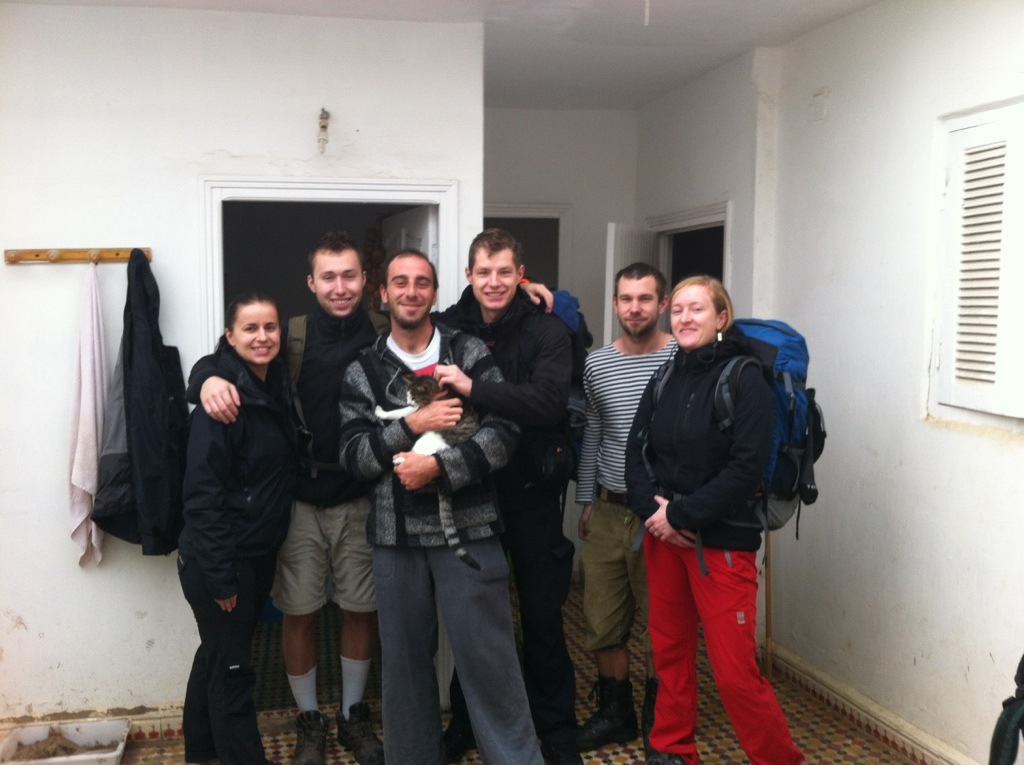
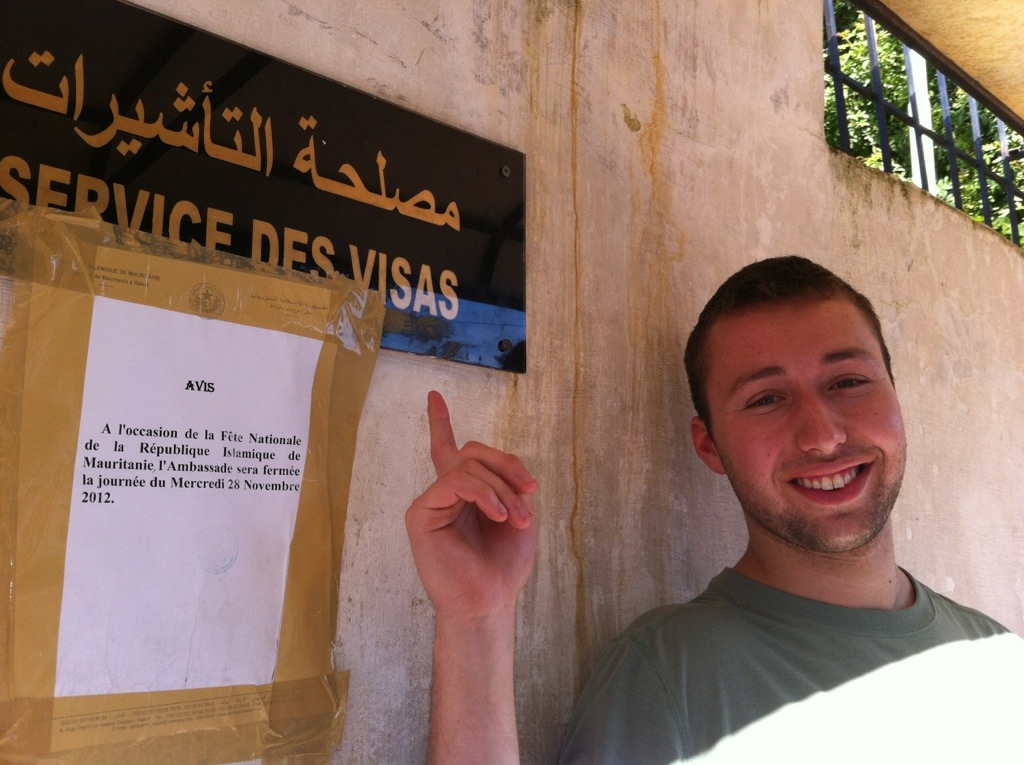
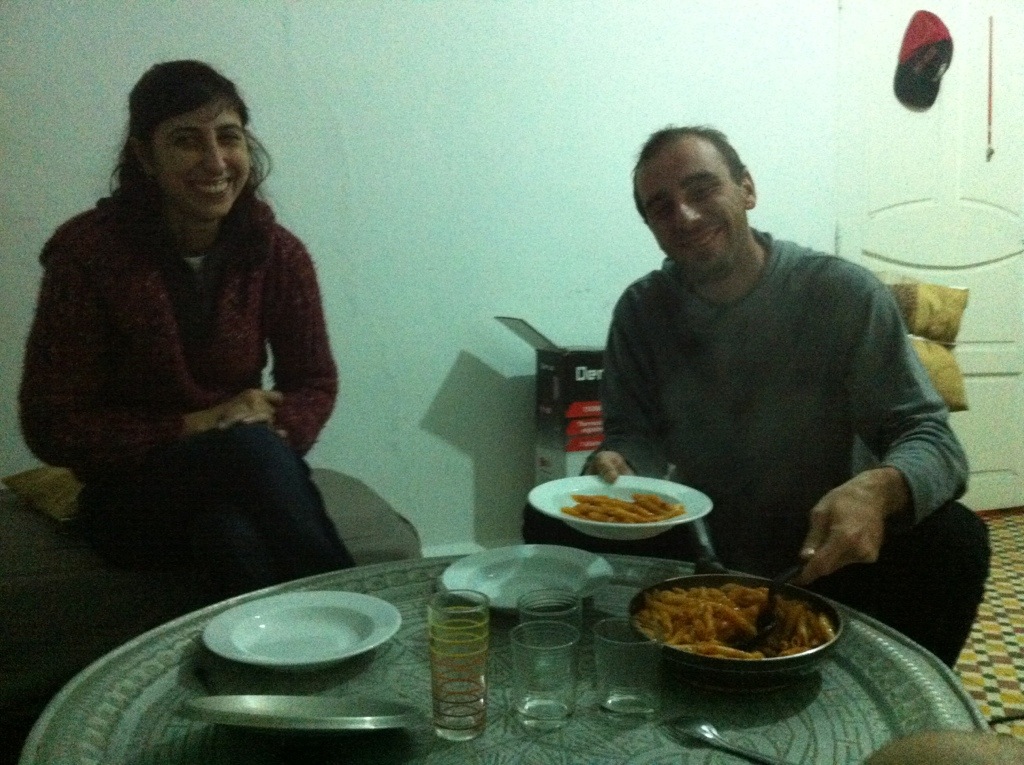
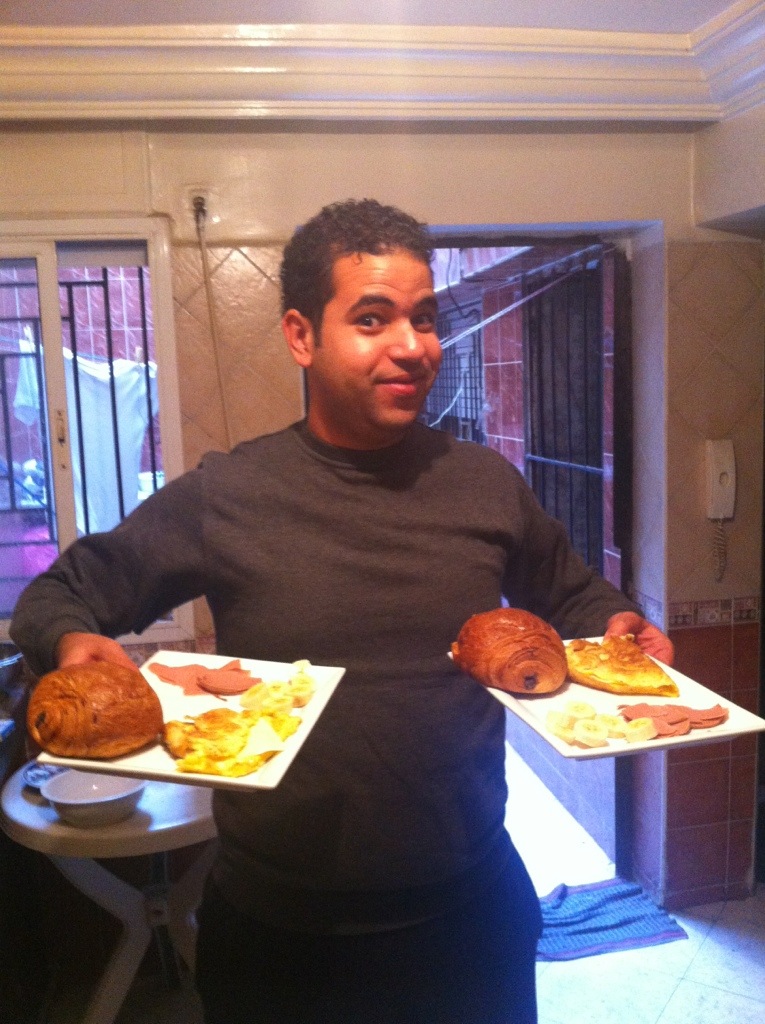
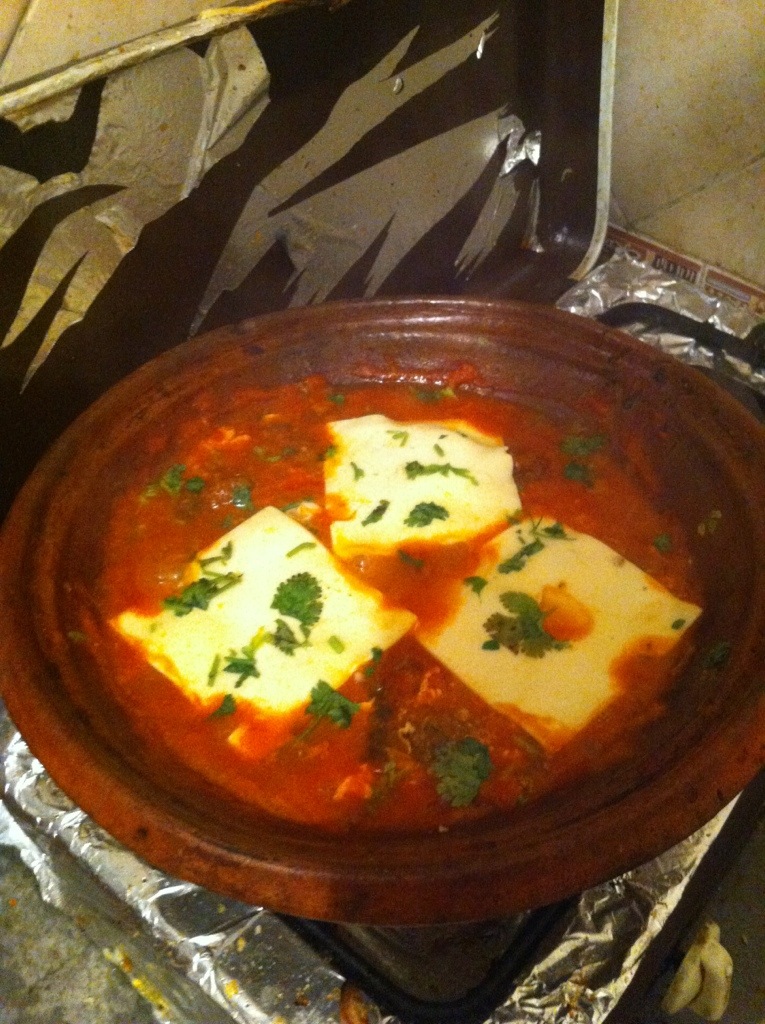
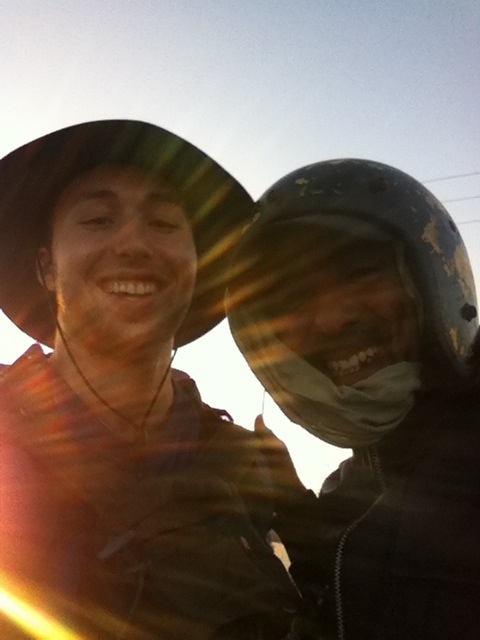
Great blog Will. Can’t wait till you get to Senegal. I hope it’s nice for you–of course it’s filled with many hustlers because there’s no work. Also the illiteracy rate is about 35% or more! Spend some money!
Sounds great. Love to read the posts. Keep us informed of your whereabouts.
Safe travels,
Love,
Dad